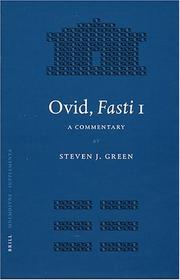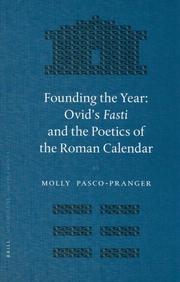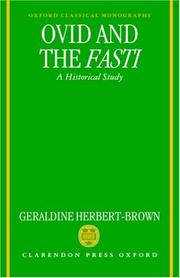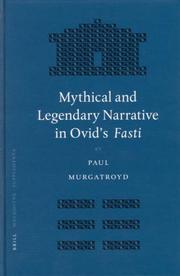| Listing 1 - 5 of 5 |
Sort by
|
Book
Year: 2006 Publisher: Oxford: Oxford university press,
Abstract | Keywords | Export | Availability | Bookmark
 Loading...
Loading...Choose an application
- Reference Manager
- EndNote
- RefWorks (Direct export to RefWorks)

ISBN: 9004139850 9047414179 9789004139855 9789047414179 Year: 2004 Volume: 251 Publisher: Leiden: Brill,
Abstract | Keywords | Export | Availability | Bookmark
 Loading...
Loading...Choose an application
- Reference Manager
- EndNote
- RefWorks (Direct export to RefWorks)
This commentary provides a detailed analysis of the first book of Ovid's Fasti, a complex poem which takes as its central framework the Roman calendar in the late Augustan/early Tiberian period and purports to deal with its religious festivals and their origins. Book 1 covers the month of January, and has proven to be particularly challenging to readers in light of the apparent revision/reworking of the text undertaken by the poet whilst in exile. This commentary - the most extensive yet on any single book of the poem - locates the text of Book 1 firmly in its literary, historical and socio-political contexts and seeks both to incorporate and build on the recent scholarship on the poem. In light of the special nature of Book 1, the commentary is prefaced by two introductory sections, the second of which tackles head-on the problems (and dynamics) of post-exilic reworking of the text.
Didactic poetry, Latin --- Literature and society --- Fasts and feasts in literature --- Calendar, Roman in literature --- Time in literature --- Poésie didactique latine --- Littérature et société --- Fêtes religieuses dans la littérature --- Calendrier romain dans la littérature --- Temps dans la littérature --- History and criticism --- Histoire et critique --- Ovid, --- Rome --- Rome dans la littérature --- In literature --- Fasts and feasts in literature. --- Calendar in literature. --- Time in literature. --- History and criticism. --- In literature. --- Poésie didactique latine --- Littérature et société --- Fêtes religieuses dans la littérature --- Calendrier romain dans la littérature --- Temps dans la littérature --- Rome dans la littérature --- Calendar in literature --- Didactic poetry, Latin - History and criticism. --- Literature and society - Rome. --- Ovid, - 43 B.C.-17 or 18 A.D. - Fasti. - Book 1. --- Rome - In literature.

ISBN: 9004151303 9789004151307 9786611399214 1281399213 9047409590 9789047409595 9781281399212 6611399216 9789047409595 Year: 2006 Volume: 276 Publisher: Leiden: Brill,
Abstract | Keywords | Export | Availability | Bookmark
 Loading...
Loading...Choose an application
- Reference Manager
- EndNote
- RefWorks (Direct export to RefWorks)
This book considers the relationship between the Fasti , Ovid's long poem on the Roman calendar, and the calendar itself, conceived of as consisting both in the rites and commemorations it organizes and in its graphic representation. The Fasti treats the calendar, recently revised by Caesar and Augustus, as its most important cultural model and as a quasi-literary 'intertext': the poem simultaneously reshapes and is itself shaped by the calendar. The study includes chapters on Book 4 and the rites of April, on the addition of Julio-Claudian holidays to the calendar, and on the final two books of the poem as shaped by the renaming of the months Quintilis and Sextilis for Julius Caesar and Augustus.
Didactic poetry, Latin --- Literature and society --- Fasts and feasts in literature. --- Time in literature. --- Calendar in literature. --- Poésie didactique latine --- Littérature et société --- Fêtes religieuses dans la littérature --- Temps dans la littérature --- Calendrier dans la littérature --- History and criticism. --- Histoire et critique --- Ovid, --- Rome --- Rome dans la littérature --- In literature. --- Poésie didactique latine --- Littérature et société --- Fêtes religieuses dans la littérature --- Temps dans la littérature --- Calendrier dans la littérature --- Rome dans la littérature --- Calendar in literature --- Fasts and feasts in literature --- Time in literature --- History and criticism --- Didactic poetry, Latin - History and criticism. --- Literature and society - Rome. --- Ovid, - 43 B.C.-17 or 18 A.D. - Fasti. --- Rome - In literature.

ISBN: 0198149352 9780198149354 Year: 1994 Volume: *2 Publisher: Oxford: Clarendon,
Abstract | Keywords | Export | Availability | Bookmark
 Loading...
Loading...Choose an application
- Reference Manager
- EndNote
- RefWorks (Direct export to RefWorks)
Ovid's Fasti has remained curiously neglected as an historical source for the period in which it was written. This new study reveals that the poem of some five thousand lines on the Roman calendar, written and revised in the years between A.D. 4-16, provides students of the Augustan age with a wealth of information, both about the author himself, and about his cultural and political environment. In addition to revelations about the way in which Augustus and his family were incorporated into the ancient religion of the city of Rome, and details of the last decade of Augustus' life and the first years of Tiberius' rule, Herbert-Brown finds in the poem new evidence of the processes which marked the transition from the Republic to Empire.
Calendar in literature --- Calendrier dans la littérature --- Festivals dans la litterature --- Festivals in de literatuur --- Festivals in literature --- Kalender in de literatuur --- Rites and ceremonies in literature --- Rites et cérémonies dans la littérature --- Ritussen en ceremoniën in de literatuur --- Rome -- Dans la littérature --- Rome -- In de literatuur --- Rome -- In literature --- Rome dans la littérature --- Rome in de literatuur --- Rome in literature --- Calendar --- Elegiac poetry, Latin --- Festivals --- Rites and ceremonies --- Calendrier --- Poésie élégiaque latine --- Fêtes --- Fêtes dans la littérature --- Rites et cérémonies --- History and criticism --- Histoire et critique --- Ovid, --- Rome --- History --- Religious life and customs --- In literature --- Histoire --- Vie religieuse --- Ovide, --- Fastes --- --Didactic poetry, Latin --- Historiography --- -Didactic poetry, Latin --- -Festivals --- -Rites and ceremonies --- -Fasts and feasts in literature --- Ceremonies --- Cult --- Cultus --- Ecclesiastical rites and ceremonies --- Religious ceremonies --- Religious rites --- Rites of passage --- Traditions --- Ritualism --- Manners and customs --- Mysteries, Religious --- Ritual --- Days --- Anniversaries --- Fasts and feasts --- Pageants --- Processions --- Latin didactic poetry --- Latin poetry --- Computus --- Astronomy --- Chronology, Historical --- Chronology --- Ovid --- -Historiography. --- Religious life and customs. --- Didactic poetry, Latin --- Fasts and feasts in literature. --- History and criticism. --- Historiography. --- Ovide --- Calendrier dans la littérature --- Poésie élégiaque latine --- Fêtes --- Fêtes dans la littérature --- Rites et cérémonies --- Rites et cérémonies dans la littérature --- Rome dans la littérature --- Fasts and feasts in literature --- Rim --- Roman Empire --- Roman Republic (510-30 B.C.) --- Romi (Empire) --- Byzantine Empire --- Rome (Italy) --- Augustus, 30 B.C.-14 A.D. --- Elegiac poetry [Latin ] --- Ovid, - 43 B.C.-17 or 18 A.D. - Fasti. --- Rome - History - Augustus, 30 B.C.-14 A.D. - Historiography. --- Didactic poetry, Latin - History and criticism --- Rites and ceremonies - Rome --- Festivals - Rome --- Calendar - Rome --- Ovid, - 43 BC-17 AD or 18 AD - Fasti --- Ovide, 43 av JC-18 --- Rome - History - Augustus, 30 BC-14 AD - Historiography

ISBN: 9004143203 9789047407225 9047407229 1433707527 9781433707520 9789004143203 1280867817 9781280867811 9786610867813 661086781X Year: 2005 Volume: 263 Publisher: Leiden: Brill,
Abstract | Keywords | Export | Availability | Bookmark
 Loading...
Loading...Choose an application
- Reference Manager
- EndNote
- RefWorks (Direct export to RefWorks)
This book analyses the mythical and legendary narratives in Ovid's Fasti as narrative and concentrates on the neglected literary aspects of these stories. It combines traditional tools of literary criticism with more modern techniques (taken especially from narratology and intertextuality). From a narratological viewpoint it covers important features such as aperture, closure, characterization, internal narrators, description, space, time and cinematic technique. On the intertextual level it examines the narratives' complex relationship with Virgil, Livy and Ovid's own earlier works. Recent criticism on the Fasti has addressed various elements (religious, historical, political, astronomical et cetera), but detailed narrative study has been wanting. This book fills that gap, to provide a more informed and balanced appreciation of this multifaceted poem aimed at classicists and literary critics in general (for whom all the Latin is translated).
Didactic poetry, Latin --- Fasts and feasts in literature. --- Legends in literature. --- Mythology, Roman, in literature. --- Narration (Rhetoric) --- Rhetoric, Ancient. --- History and criticism. --- History --- Ovid, --- Knowledge --- Mythology. --- Rome --- In literature. --- Ancient rhetoric --- Antieke retoriek --- Fasts and feasts in literature --- Feesten [Godsdienstige ] in de literatuur --- Fêtes religieuses dans la littérature --- Godsdienstige feesten in de literatuur --- Legenden in de literatuur --- Legends in literature --- Légendes dans la littérature --- Mythologie [Romeinse ] in literatuur --- Mythologie romaine dans la littérature --- Mythology [Roman ] in literature --- Retoriek [Antieke ] --- Retoriek van de Oudheid --- Rhetoric [Ancient ] --- Rhétorique ancienne --- Rhétorique de l'Antiquité --- Rome -- Dans la littérature --- Rome -- In de literatuur --- Rome -- In literature --- Rome dans la littérature --- Rome in de literatuur --- Rome in literature --- Poésie didactique latine --- Mythologie romaine dans la littérature --- Fêtes religieuses dans la littérature --- Légendes dans la littérature --- Rhétorique ancienne --- Histoire et critique --- Rome dans la littérature --- Mythology, Roman, in literature --- Rhetoric, Ancient --- Classical languages --- Greek language --- Greek rhetoric --- Latin language --- Latin rhetoric --- History and criticism --- Rhetoric --- Nasó, P. Ovidi, --- Naso, Publius Ovidius, --- Nazon, --- Ouidio, --- Ovide, --- Ovidi, --- Ovidi Nasó, P., --- Ovidiĭ, --- Ovidiĭ Nazon, Publiĭ, --- Ovidio, --- Ovidio Nasón, P., --- Ovidio Nasone, Publio, --- Ovidios, --- Ovidiu, --- Ovidius Naso, P., --- Ovidius Naso, Publius, --- Owidiusz, --- P. Ovidius Naso, --- Publiĭ Ovidiĭ Nazon, --- Publio Ovidio Nasone, --- Ūvīd, --- אוביד, --- Ovid --- Mythology --- Didactic poetry [Latin ] --- To 1500 --- Didactic poetry, Latin. --- Literature. --- Narrative (Rhetoric) --- Narrative writing --- Discourse analysis, Narrative --- Narratees (Rhetoric) --- Myths --- Legends --- Religion --- Religions --- Folklore --- Gods --- Myth --- Belles-lettres --- Western literature (Western countries) --- World literature --- Philology --- Authors --- Authorship --- Latin didactic poetry --- Latin poetry --- Fasti (Ovid) --- Fastes (Ovid) --- Tempora cum causis Latium digesta per annum (Ovid) --- Rome (Empire) --- Rim --- Roman Empire --- Roman Republic --- Romi (Empire) --- Byzantine Empire --- Italy --- Didactic poetry, Latin - History and criticism. --- Narration (Rhetoric) - History - To 1500. --- Ovid, - 43 B.C.-17 or 18 A.D. - Fasti. --- Ovid, - 43 B.C.-17 or 18 A.D. - Knowledge - Mythology. --- Rome - In literature. --- Ovid, - 43 B.C.-17 or 18 A.D.
| Listing 1 - 5 of 5 |
Sort by
|

 Search
Search Feedback
Feedback About UniCat
About UniCat  Help
Help News
News